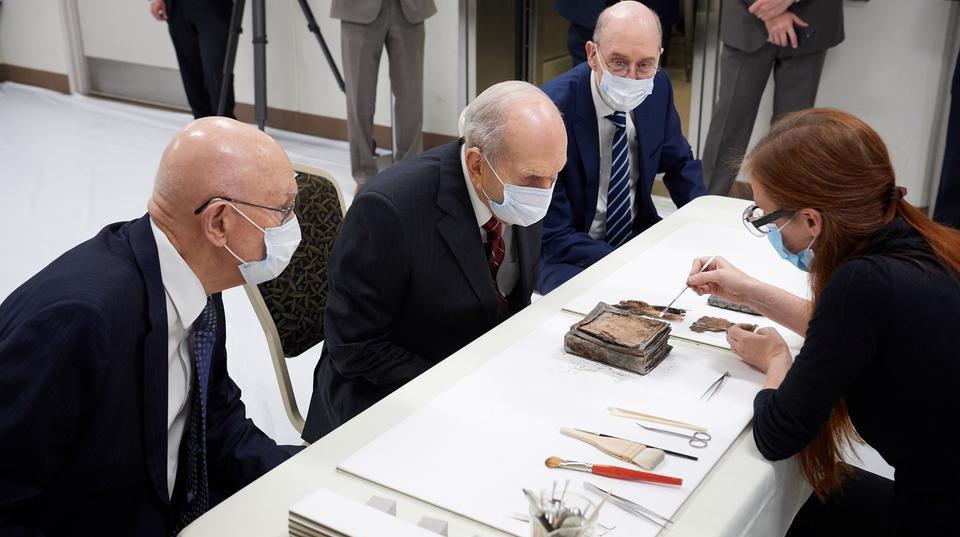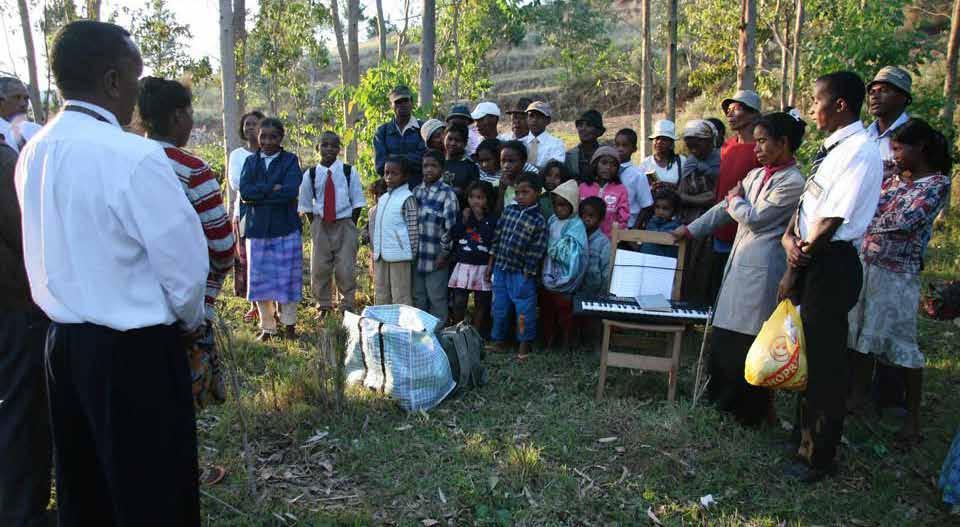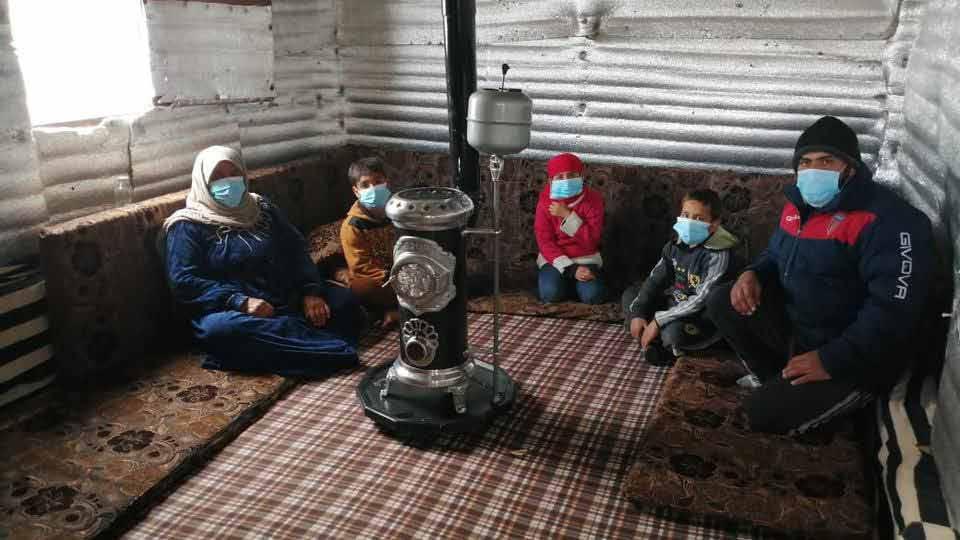
9 minute read
Healing the wounds of racism
BY KARISSA NEELY
Herald Correspondent
After the May 25 death of George Floyd, a Black man, at the hands of a white police officer in Minnesota sparked outrage across the nation, Black men and women of The Church of Jesus Christ of Latter-day Saints hope the faithful within their own congregations will more earnestly seek to heal the wounds of racism.
Even within the circle of church membership, people can do better, Zandra Vranes explained in a June 20 video on the Black LDS Legacy Facebook group. Vranes, author, speaker and one half of the duo Sistas in Zion, asked members to “yoke up” with Black members and to live up to their covenants to “mourn with those who mourn, and comfort those who stand in need of comfort.”
“We just want to be loved, to be supported by our faith community,” she said.
Darius Gray asked for this as well in a 2016 post for the church’s website, churchofjesuschrist.org.
“[I]t would be beneficial if we became a community of listeners. If we first endeavored to truly hear from those we consider as ‘the other,’ and if our honest focus was to let them share of their lives, their histories, their families, their hopes, and their pains, not only would we gain a greater understanding, but this practice would go a long way toward healing the wounds of racism,” he said.
Gray is an author, speaker, and one of the original founding members and leaders of the Genesis Group, an organization established in 1971 by the presidency of the church to serve the needs of Black members.
In his 2016 post, Gray asked church members to acknowledge and recognize that racism still exists even within the hearts of members, and to actively work to become more Christlike in thought and action.
“If you are seeking a way to approach those who may appear different, I offer this advice, which has helped me nego tiate life’s pathways,” he said. “Meet the person, not the color. Greet the individual, not the ethnicity. See the child of God for
ISAAC HALE, DAILY HERALD Joseph Freeman poses for a portrait in his West Valley City home on Friday, June 5, 2020. Freeman was the first black person to receive the priesthood from The Church of Jesus Christ of Latter-day Saints. He was baptized on Saturday, Sept. 20, 1973, and received the priesthood on Sunday, June 11, 1978.
who he or she really is — a brother or sister — rather than someone different.”
African Americans are about 14% of the population of the United States, according to census estimates. Within the church, they only account for 4% of the membership, Jana Riess explained in her book, “The Next Mormons: How Millennials are Changing the LDS Church.” Thus, they are very small in ranks and often are the only people of color in their local congregation.
Black in Utah
Isaac Thomas
Isaac Thomas joined the church in 1972, even though he initially struggled with the policy denying Black men the priesthood.
“But something just whispered, ‘It’s OK. If the Lord is in charge, I’m OK,’ “ Thomas, 71, said in a recent interview at his home in Orem.
Though he wanted to serve a mission for his faith, without the priesthood he could not. So he looked around for another way to serve, and ended up with the Young Ambassadors, a performance group from Brigham Young University. He feels his two years with that group, traveling all over the United States, was an important mission.
“I talked to a lot of people about the church as we traveled around. And I always got a lot of questions,” he said.
Often, people asked him how he could be a member of a racist church because of the priesthood policy before 1978. He always defended the church and its members, explaining to questioners that he did not experience any more racism within this
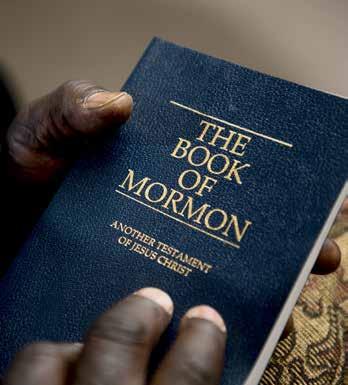
ISAAC HALE, DAILY HERALD Joseph Freeman holds his copy of The Book of Mormon while posing for a portrait in his West Valley City home on Friday, June 5, 2020.
church than he had seen and experienced with members of other religions.
He also lived by a friend’s advice. The friend told Thomas he would find people in the church who were racist, and to simply avoid them. He’d find others who just were acquaintances. “Others will love you as you are, cleave to them,” the friend concluded.
When the church’s 1978 proclamation restoring the priesthood to Black males was announced, Isaac was engaged to his soon-to-be wife, Claudia. Instead of the civil wedding they’d thought was their only option, they were sealed in the Salt Lake City Temple. They were the first living Black couple sealed in any temple.
Thomas and his wife have lived in Orem for 40 years, raising seven children in Utah. While he’s experienced racism within and out of the church, he said he has never experienced overt racism in the church. He has felt a strong support system around both him and his family.
“If something overtly racist happened to me, I’d have a front yard full of people here ready to fight for me, and I’d have to calm them all down,” he said with a laugh.
Thomas expressed concern about the protests and rioting he witnessed across the nation this summer. Originally from Missouri, he remembers what it was like as a child in the 1950s, and participated in civil rights marches there in the late 1960s.
“The Civil Rights Movement was a peaceful movement, a movement not just for Black civil rights but for everyone’s civil rights. Not like today where everyone is sectioned off to their corners,” Thomas said. “The movement I was a part of was to end segregation. But today, people are selfsegregating and it doesn’t make sense.”
Thomas is also a Vietnam veteran, and he feels society — after so much improvement in race relations since his childhood days in the 1950s — has taken a few steps back in the last decade. Those fighting for social justice have lost a sense of what they are fighting for.
“Some of this is way out of control. We’re making known criminals, who have a history with the police, our heroes,” Thomas said. “We’re teaching Black children that if the police lock you up, you’re a hero. What kind of message is that?”
Thomas worries that current generations don’t have a solid understanding of
JOHNNY MORRIS, SPECIAL TO THE DAILY HERALD Kofi Aidoo, 23, a student at Brigham Young University, leads chants during the March Against Racism rally held at the Provo Historic Courthouse on Saturday, June 13, 2020. About 1,500 people gathered to protest for civil rights after a series of protests across the country and the state. The protest was co-organized by Women’s March Provo and Project Blindspot.
Black history. Black history has never been taught enough in our schools, he said, but those who are taking down statues “dedicated by Frederick Douglass, or paid for by slaves — that’s canceling history.”
“We are not a perfect country. But what we do is try to correct the mistakes of the past,” he said.
He also recognizes that the people within the church, himself included, are not perfect. And he doesn’t expect them to be. But he stands by his faith, his experiences and the leadership of the church.
“I have not had one prophet since I’ve been a member of the church not denounce racism and bigotry. And many times when they talk about it, the people who need to
2018
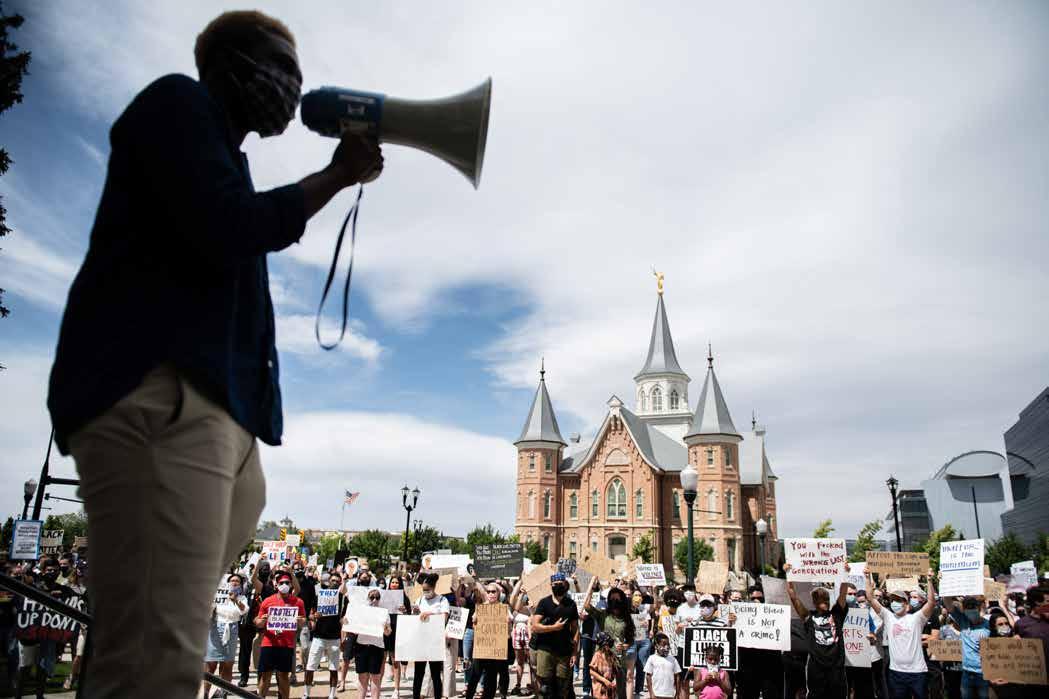
2019
Your Favorite Indian Cuisine

D A I L Y H E R A L D T H E B E S T O F
UTAH VALLEY
R E A D E R S ’ C H O I C E 2018 A W A R D S D A I L Y
H E R A L D
T H E O F
UTAH VALLEY
R E A D E R S ’ C H O I C E 2020 A W A R D S
Open |

(Monday - Friday) 11am to 10pm - (Saturday) 11:30am-10pm
Pick up & Delivery Available
98 West Center St. • PROVO 801-373-7200 1086 W South Jordan Pkwy • S. JORDAN • 801-302-0777 indiapalaceutah.com
Two Additional Locations to Serve You Curry Pizza • 2927 S. 5600 W. • West Valley City • 801-890-0415 Curry Pizza • 125 N. SR24 • Bicknell, UT • 435-425-2500 www.currypizzautah.com
hear it are not in the room,” he said.
Joseph Freeman
Joseph Freeman, a 68-year-old resident of West Valley, grew up in North Carolina, where he often passed remnants of burnt KKK crosses on his neighbors’ front lawns as he went to school. At the age of 10, he helped out at a local farm with a few other children, and his mother fretted because one of them was a white girl just younger than him.
“My mother was so afraid for me. She’d tell me to stop talking to that girl. To me, she was just one of the other kids there, but I could be in danger of being killed just for talking with a white girl,” Freeman said in a recent phone interview.
He frequently experienced racism, even after he’d left North Carolina. At one point, he owned a commercial custodial business and often worked in Denver, driving from site to site.
“I was stopped by police at least once a month in downtown Denver. It went on for years like that,” he said.
Freeman joined the church in 1973. After the church’s 1978 proclamation restoring the priesthood to Black males was announced, he was the first black man of African descent, since the time of Joseph Smith, to be ordained as an elder in the church. The office of elder allows him to officiate in all the sacred sacraments or covenants in the church. He said he feels blessed to be a part of the church.
And much has changed in race relations for the better — both within and without the church — since his younger days. But he also feels the current racial tensions right now are a call for all people — and especially people of faith — to wake up.
“It’s a call for you to ask, ‘How am I acting? How do I feel about people?’ and see the change you need to make. That’s the gospel of repentance — to help us become better people through Christ. To throw off the old person you were and become a child of God and act like he acts, do as he does, and love as he loves,” he said.
Freeman echoed Thomas’ sentiments that integrating ourselves with people of different colors, ethnicities and beliefs allows us to see that everyone breathes like everyone else, that “we’re all of the same blood, all of the same family.”
“If you can come to that thought — if you could really think like that — then it could be better,” he said.
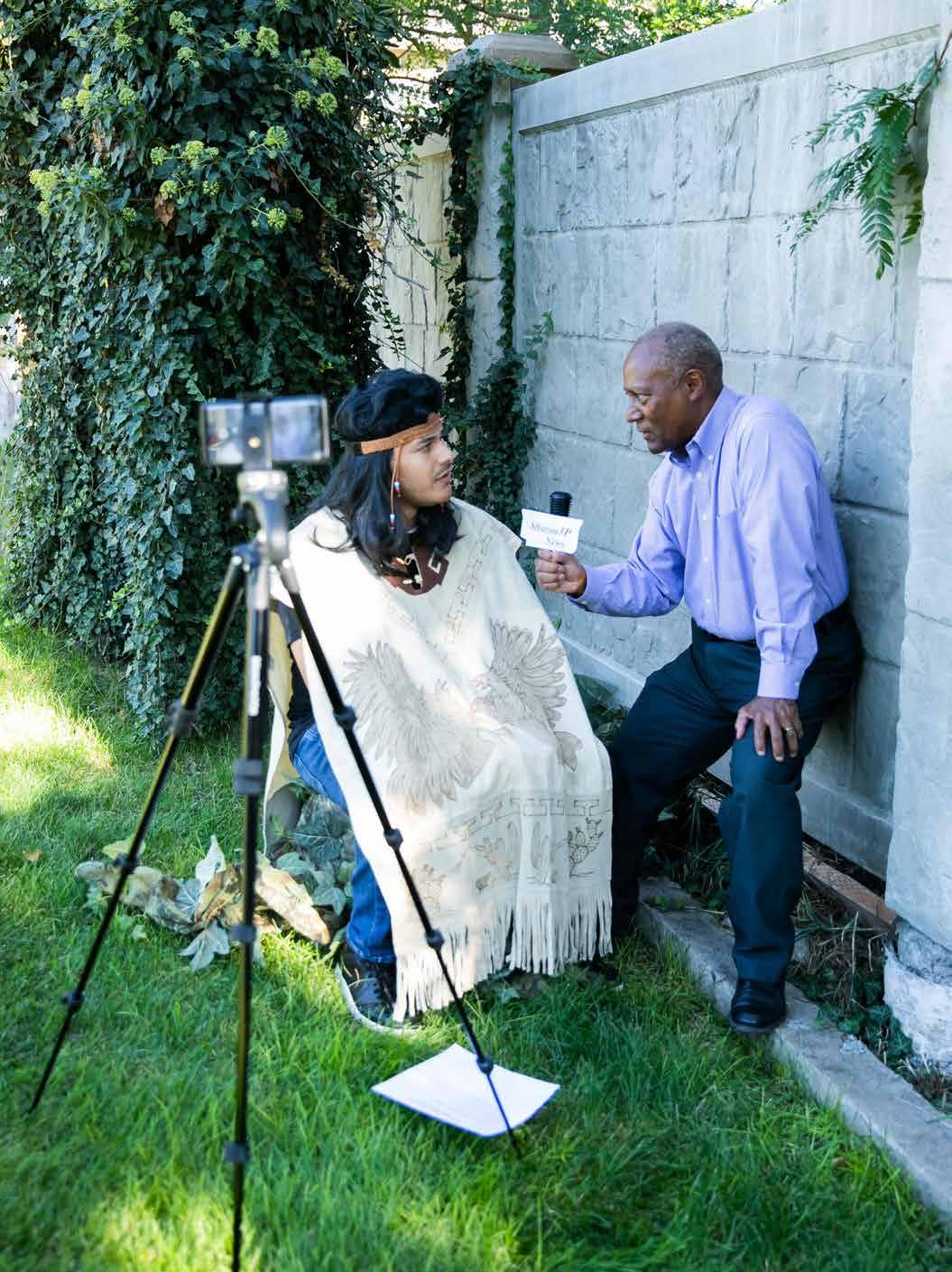
ARI DAVIS/SPECIAL TO THE DAILY HERALD Isaac Thomas, right, interviews Jaxson Jefferson who poses as Samuel the Lamanite for a Church of Jesus Christ of Later-day Saints’ Primary Singing Time video at Thomas’ house in Orem on Friday, Sept. 4, 2020.

